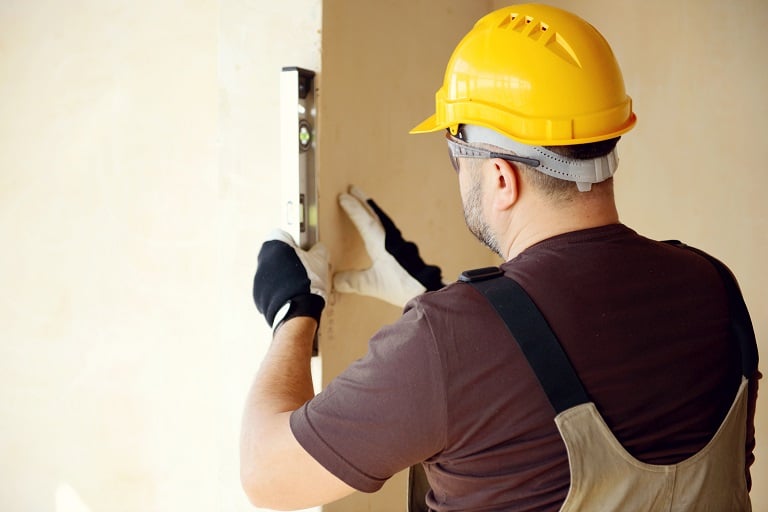Everything You Need to Know About Asking a Contractor for References
Checking references is one of the most important steps in finding the right contractor


When you need a project done, and done right, it’s crucial to ask a contractor for references. Hiring the right contractor with trustworthy references can help to ensure your job is in good hands. Online reviews can be a good place to start, but checking contractor references will give you better insight into what it will be like working with them.
Why You Need References
There are many reasons to ask a contractor for references. Sure, you can look at online reviews to avoid hiring a contractor that abandons projects halfway through, but online reviews only tell so much. Oftentimes they are only posted by the most disgruntled or overjoyed clients, meaning they can be skewed and less reflective of the average experience.
Plus, asking for references for projects similar to your own will be more reflective of what your experience will be like, unlike online reviews that could be referencing a wide variety of projects.
References can tell you if the contractor stuck with the timeline, if there were any issues with the payment process, and the overall quality of their work, even after the project has wrapped.
Checking references can also help you get a sense of if a contractor is trustworthy and plays by the book. What if clients regularly have issues with a contractor not pulling appropriate permits? You can save yourself a headache down the road by checking with references.
How to Ask a Contractor for References
Asking a contractor for references might feel awkward, but a trustworthy contractor should be more than happy to provide them. When searching for a contractor, ask for references with the quote. You should get quotes and ask for references from about three contractors.
If the contractor is apprehensive about sharing references, look elsewhere. The Contractors State License Board even suggests asking contractors for client references, so it is standard in the industry.
A contractor who doesn’t cut corners, communicates clearly, and puts quality and safety at the top of their priorities won’t be afraid to share a solid list of references with you.
How Many References To Check
Ask each contractor on your shortlist for at least three references, and you should reach out to them by phone.
Once you are talking with a reference, be sure to verify that the reference is valid. To do so, discuss your project and confirm that the contractor completed similar work for the client. You don’t want a reference who had commercial work done when dealing with a residential project, as the experiences could be quite different in terms of pricing, timelines, and paperwork.
Quotes and timelines may vary, but always make sure your contractor provides the appropriate paperwork to avoid any legal issues.

What to Ask When Checking References for Contractors
Now it’s time to dial those references’ numbers and start gathering information. Jot down open-ended questions that will encourage the reference to respond with more than just a “yes” or “no.” Here are some general topics to focus on during the conversation.
Timeline
Price
Quality of Job
Issues Afterward
Handling the Unexpected
Communication
Project Satisfaction and Rehiring
Timeline
Construction projects are frequently delayed. Small delays aren’t necessarily a cause for alarm and shouldn’t completely deter you from hiring the contractor in question, but it’s good to get an idea of what kind of delays came up along the way. Did the reference have any issues with the timeline? If the contractor extended the project, what reason did they provide? Did this impact the project cost? The answers to these questions are especially important to know for general contractors with hourly rates.
Price
Did the project stay on budget? If not, why did the price increase? If it came in under budget, does it seem like the contractor cut corners or asked the client to make some sacrifices to reduce costs?
Quality of Job
Is the finished product up to the reference’s standards? Did the contractor maintain safety standards throughout the project and clean up the area at the end of the day? What did the reference think of the quality from start to finish?
Issues Afterward
Even after the project wraps up, issues can arise later on. If there was a leak a month after a contractor finishes a roofing project for the client, did the contractor come back to fix it? While it’s not uncommon to have issues come up after the contractor completes the work, many references won’t have any issues to speak of. That’s good news.
Handling the Unexpected
With construction work, many different issues can pop up unexpectedly. A good contractor will be prepared anyway and can address surprises head-on. Ask the reference if any roadblocks came up during the project. If so, how did the contractor respond? If the issue wasn’t in their expertise, did they hire subcontractors? Is the reference satisfied with how the subcontractors handled the issue?
Communication
Did the contractor handle all the appropriate paperwork? Verify that the contractor pulled necessary permits, provided contracts for the client to sign and proof of licensing and insurance. If the project led to issues or delays (it’s construction, after all!), did the contractor inform the client in a timely manner?
Project Satisfaction and Rehiring
Is the client happy with the completed work? Would they hire the contractor for other projects in the future, and would they recommend the contractor to friends or family? There are bound to be drawbacks with any construction project, but if the contractor has excellent customer service and high-quality work, a reference’s willingness to rehire the contractor speaks volumes.
On the other hand, if the reference wouldn’t rehire the contractor, ask why. Perhaps the cost was too high, although the quality was excellent. Even if a reference wouldn’t rehire the contractor, their reasons will help determine if you should also rule out this contractor for your project.
Check References For a Better Contractor Experience
Asking a contractor for references and then reaching out to those references can be a little intimidating, but when it comes to your home, you can’t be too careful. Reaching out to references can give you peace of mind and help you find the best contractor for your project.





- Bathroom Remodeling
- Kitchen Remodeling
- Shower Installation
- Stair Installers
- Bathtub Installation
- Shower Door Installers
- Kitchen Design
- Bathroom Design Companies
- Storm Shelter Builders
- Pre-Made Cabinets
- Kitchen Refacing
- Bathtub Replacement
- Ceiling Tile Installation
- Suspended Ceiling Companies
- Residential Designers
- Stair Builders
- Remodel Designers
- Shower Enclosures
- Home Renovations
- Kitchen Renovations
- Garage Remodeling
- Grab Bar Installation
- Walk-In Tub Installers
- Tub to Shower Conversion
- Balcony Contractors









